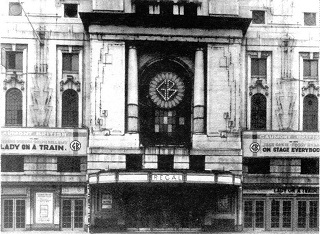Raphael Hart (RH-95-201)

Regal, Norwood (uploaded by Ken Roe) Creative Commons (Attribution) License via cinematreasures
In June 1995, Ralph (Raphael) Hart heard about Cinema Culture in 1930s Britain through a Jewish Friendship Club in the London suburb of Harrow. He volunteered to take part in the project, joining its eighteen Harrow-based core informants. Mr Hart was born in 1921 in Brixton, South London, the only child of middle-class parents; his family moved to Golders Green when he was around seven years old. Having won a scholarship to a grammar school in Ashford, Kent, he lived in Norwood, South London during his years in secondary education. His first job on leaving school at the age of nineteen was as a railway clerk; and after taking a University degree later in life he worked as a tutor in a correspondence college. He was interviewed on 24 July and 27 November 1995 at the Middlesex New Synagogue in Harrow.
Mr Hart's first interview opens with recollections of early visits to the cinema from the age of seven or so in the company of his mother. He recalls some films and stars of the time, and names a couple of cinemas in Golders Green that he frequented. Alluding to the film newsreels that he saw during the 1930s, he declares his left-wing political sympathies and mentions some films about World War One. While confessing that he liked musicals--especially Astaire and Rogers--for their entertainment value, he is dismissive of other types of popular cinema ("I was a serious sort of chap"). He remembers going to see Russian and other 'foreign' films in the thirties, and recollects a varied diet of film viewing when on war service in the Far East. From time to time throughout the interview, he asks the interviewer to look up films in the copy of Halliwell's Film Guide that he has brought along. Mention of the 1933 British film I Was A Spy at the start of his second interview reminds Mr Hart of a school visit to the WW1 battlefields of Belgium. Most of his schoolmasters, he says, had served in that war--it was "only yesterday" to those men, and "living history" to his own generation. This triggers a discussion of war films, in the course of which Mr Hart reiterates that serious films and "realism" appeal to him, that he likes mysteries because they call for intelligence on the viewer's part, and that his preference is for films with plenty of action and a complete absence of women and "soppy love interest". He reflects on Britain's unpreparedness for war in the 1930s, and on Nazi propaganda and the films of Leni Riefenstahl. He recalls being deeply and lastingly upset by the film Outward Bound. He is unable to bring to mind any engagement on Hollywood's part with the Great Depression of the 1930s; and offers an interesting analysis of the plot of King Kong. Leafing through a 1938 film annual elicits recollections of many more films and personalities, and calls to mind his mother's favourite stars. Again, the interview is punctuated with requests for the interviewer to look up certain films in his copy of 'Halliwell's Film Guide'.Interview transcript | Listing of cinemas, films and stars mentioned
Audio-synced interview (2 of 2)
Interview transcript | Listing of cinemas, films and stars mentioned
Documents, Memorabilia and Related Links
Harrow home pageCurzon, Mayfair (cinematreasures site)
Clip from All Quiet on the Western Front, 1930 (Youtube)
Clip from Gold Diggers of 1933 (YouTube)
Trailer from Outward Bound, 1930 (YouTube)